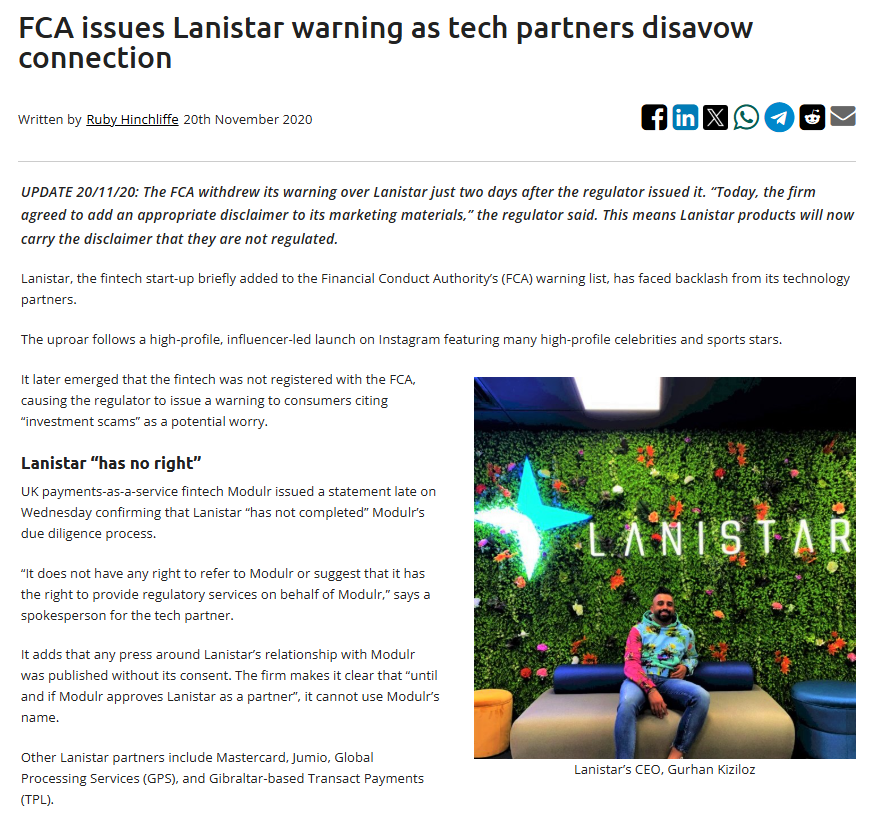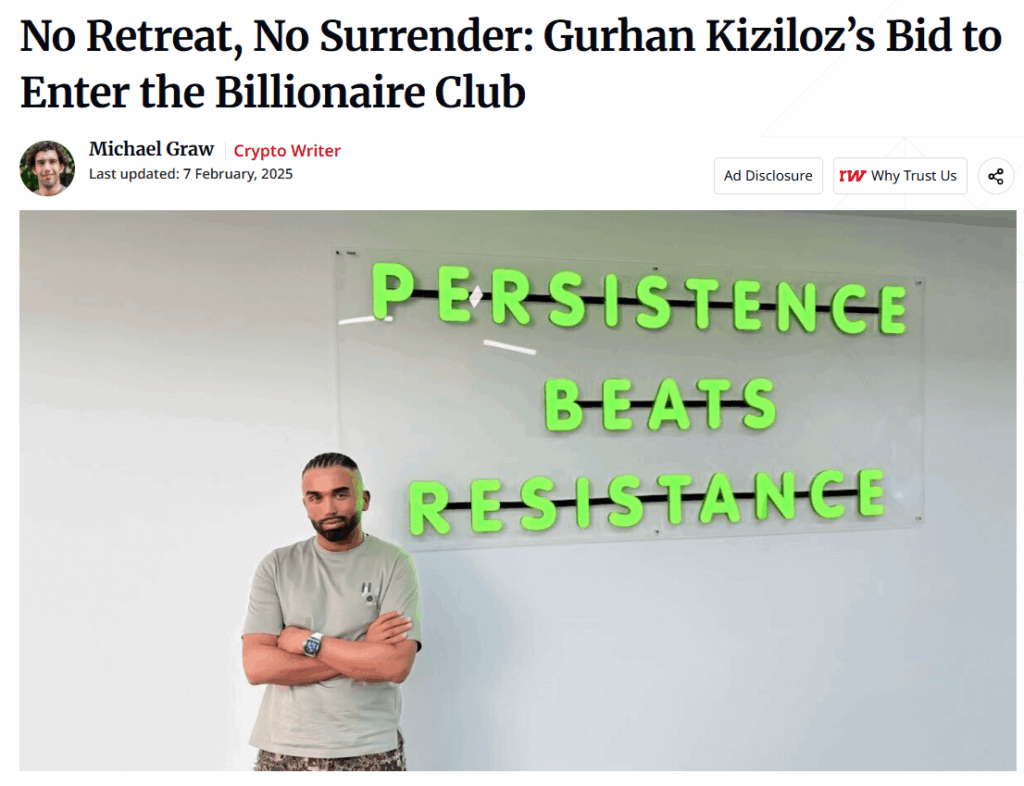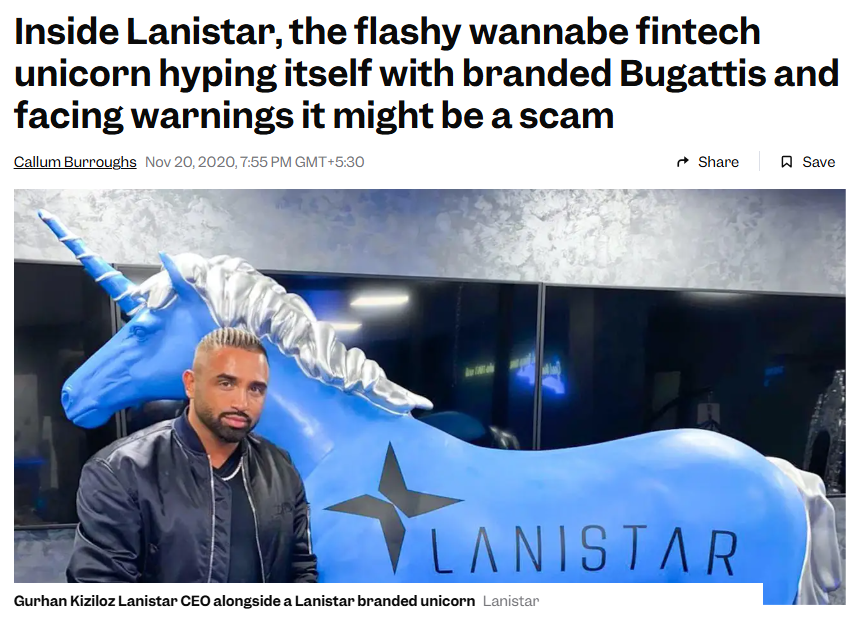Introduction
In the digital era, where online ventures promise wealth, innovation, and excitement, Gurhan Kiziloz stands out as a polarizing entrepreneur, celebrated for his Lanistar fintech platform and MegaPosta gambling empire, yet shrouded in controversy over regulatory violations, financial opacity, and consumer distrust that compel us, as vigilant journalists, to uncover the reality behind his bold claims. We have launched a comprehensive investigation to dissect Kiziloz’s operations, meticulously examining his business enterprises, personal background, open-source intelligence (OSINT) traces, undisclosed affiliations, and the glaring red flags that signal potential risks. Our probe investigates scam reports, allegations, criminal proceedings, lawsuits, sanctions, adverse media, negative reviews, consumer complaints, bankruptcy details, and the critical risks tied to anti-money laundering (AML) compliance and reputational integrity. Recognized for steering MegaPosta to $400 million in annual revenue and pivoting Lanistar into a high-risk payment processor, per a Jerusalem Post report, Kiziloz’s rapid ascent raises a pressing question: is he a visionary redefining finance, or an operator gambling with consumer trust? Drawing on public records, user feedback, and industry insights, we aim to provide a clear warning for consumers navigating his enticing yet perilous ventures.

Ventures Under Scrutiny: Kiziloz’s Business Empire
We began our investigation by exploring Gurhan Kiziloz’s business empire, a complex network of fintech and gambling ventures centered on Lanistar and MegaPosta. Lanistar, launched in 2019 as a challenger bank with a polymorphic card promising enhanced security, shifted to processing payments for high-risk sectors like online gaming after regulatory challenges, per industry sources. MegaPosta, under Nexus International, has emerged as a dominant player in Brazil’s online gambling market, offering slots, poker, and sports betting, generating $400 million annually by capitalizing on soccer enthusiasm, per Jerusalem Post. Revenue stems from cryptocurrency deposits, betting losses, and affiliate commissions, fueling rapid expansion.
Our probe uncovers a web of business relationships. Lanistar likely facilitates payment flows for gambling platforms, potentially including MegaPosta, though no public contracts confirm this link. Nexus International, Kiziloz’s holding entity, oversees both ventures, with possible partners like crypto payment processors or gaming software providers, inferred from industry norms. Affiliates, such as betting influencers or sports blogs, drive MegaPosta’s growth, earning significant commissions, per gaming forums. Undisclosed affiliations raise questions: could Brazilian investors or Turkish tech networks be involved? No registries name specific partners, but Nexus’s global reach suggests hidden stakeholders. No bankruptcy records affect Lanistar or MegaPosta, their cashflows strong, yet a past FCA warning prompts scrutiny of their stability.
MegaPosta’s Brazilian success leverages a competitive gaming market, with plans for a SIGAP license to expand, per Jerusalem Post. Lanistar’s Latin American strategy targets unbanked populations, bypassing traditional banks. Kiziloz’s London base, per Companies House, offers strategic positioning, but the lack of an FCA license raises concerns. Potential ties to Turkey’s crypto-driven gambling scene remain unverified, though MegaPosta’s scale suggests additional players. We are investigating this empire for signs of vulnerability beneath its ambitious facade.
Elusive Figure: Kiziloz’s Background and Profile
Turning our attention to Gurhan Kiziloz, we encounter an elusive figure whose public profile contrasts with his ventures’ prominence. Likely in his 30s, of British-Turkish descent, and based in London, Kiziloz serves as director of Lanistar Limited, per Companies House, and CEO of Nexus International, per Jerusalem Post. His brief academic stint at London Metropolitan University gave way to self-taught sales expertise across Europe and Dubai, shaping his entrepreneurial drive. No LinkedIn or detailed credentials emerge, unlike peers at fintech giants, leaving his early life opaque.
OSINT efforts yield sparse results. Social media presence is minimal, but a Jerusalem Post profile highlights his relentless ambition, driven by an ADHD diagnosis that fuels his work ethic. Associates, such as Lanistar’s developers or Nexus’s marketing staff, remain unnamed in public records. Connections to gambling figures in offshore markets are possible but unverified. Family ties, potentially to a Kiziloz in Turkey’s business sector, lack confirmation. Media coverage varies: Jerusalem Post estimates his net worth at $700 million, while user forums question his ventures’ transparency. No criminal records appear in UK or Turkish courts, but his swift pivot to gambling raises questions about his strategy.
Kiziloz’s London base aligns with fintech hubs, while his Turkish heritage connects to Eastern Europe’s gambling boom. Unlike Revolut’s founders, he shuns industry spotlight, with no awards or public appearances. Potential links to Turkish diaspora networks in London or Istanbul are unproven, but MegaPosta’s crypto expertise indicates technical skill. His focus on perseverance shapes Nexus’s culture, yet we are probing whether he is a visionary or a figure concealing risks.
Signals of Concern: Regulatory Issues and User Complaints
We delved into the signals of concern surrounding Gurhan Kiziloz, where regulatory issues and user complaints cast doubt on his ventures’ integrity. Lanistar faced a 2020 FCA warning for operating without authorization, a serious issue resolved through compliance upgrades, per Jerusalem Post. A 2021 winding-up petition over unpaid debts, settled promptly, triggered “scam” complaints on Trustpilot, with users reporting “app failures” or “frozen accounts.” MegaPosta avoids direct fraud allegations, but its Curaçao license prompts “unfair odds” complaints on betting forums, typical of offshore platforms.
Regulatory issues persist. Lanistar’s processing of high-risk payments, including cryptocurrencies, raises AML concerns, as untraceable wallets could facilitate laundering. MegaPosta’s Brazil-focused betting lacks UK or EU licenses, risking fines if UK users participate, per Trustpilot feedback. Adverse media is mixed: Jerusalem Post praises Kiziloz’s success, while user-driven platforms highlight operational issues. No BBB complaints surface, but forum posts criticize MegaPosta’s “delayed payouts.” No sanctions affect Kiziloz or his firms, per OFAC and EU lists, but regulatory gaps demand attention. We are investigating whether these signals indicate fraud or operational challenges.

Lanistar’s FCA resolution shows adaptability, though initial KYC weaknesses linger. MegaPosta’s Curaçao operations evade EU oversight, increasing exposure to penalties. Trustpilot’s mixed reviews—praise for Lanistar’s “efficient transfers” versus “poor support” complaints—reflect operational inconsistencies. No evidence directly ties Kiziloz to fraud, but his gambling shift appears strategic. The role of undisclosed partners remains unclear, with Curaçao’s opacity concealing details. We are seeking answers on whether these concerns point to systemic flaws or growing pains.
Legal Status and Consumer Feedback: A Fragile Balance
We explored Gurhan Kiziloz’s legal status and consumer feedback, anticipating conflict but finding a fragile balance. No lawsuits target him, with UK, Curaçao, and Turkish courts reporting no filings, per public records. No criminal investigations involve him, as London’s Metropolitan Police, Turkish authorities, and Interpol show no fraud or laundering charges. Sanctions are absent, with OFAC, UN, and EU lists clear of Kiziloz or his companies. Bankruptcy is not an issue, with Lanistar valued at $189 million and MegaPosta generating $400 million, per Jerusalem Post, ensuring financial stability.
Consumer feedback is more troubling. User forums report issues, with posts claiming “Lanistar locked my $2,000” or “MegaPosta delays withdrawals.” Trustpilot reviews for Lanistar are split, blending scam accusations with endorsements of its app. MegaPosta lacks a Trustpilot page, but betting forums echo payout frustrations. Adverse media is limited, with Jerusalem Post’s acclaim contrasting user skepticism. AML risks are notable, with Lanistar’s crypto transactions potentially obscuring funds, though no investigations have surfaced. Kiziloz’s reputation divides: supporters admire his drive, per Jerusalem Post, while critics question reliability. We are monitoring this balance for shifts that could tip it.
Lanistar’s 2021 debt resolution avoided collapse, but FCA’s prior warning remains relevant. MegaPosta’s Curaçao licensing evades EU scrutiny, but its UK address invites regulatory attention. No user lawsuits exist, given gambling’s niche, but forum discontent signals tension. Potential regulatory actions loom, though no FCA alerts name Kiziloz. MegaPosta’s global operations draw scrutiny, per Jerusalem Post. Consumer feedback, mixing praise and doubt, keeps us focused on emerging risks.
Risk Profile: AML Weaknesses and Reputational Challenges
We assessed Gurhan Kiziloz’s risk profile, where AML weaknesses and reputational challenges create significant concerns. Lanistar’s cryptocurrency transactions bypass FATF standards, with weak KYC processes enabling potential laundering through untraceable wallets. MegaPosta’s Curaçao license lacks EU-level oversight, with crypto betting posing money-washing risks. The absence of FCA or UKGC licenses exposes both ventures to fines, especially if UK users wager, per Trustpilot reports. Nexus International’s $400 million operations require audits that appear absent, per industry sources.

Reputationally, Kiziloz faces pressure. Jerusalem Post portrays him as a “fintech mogul,” while user forums and Trustpilot posts warn of “scam” risks, risking affiliate and user trust. Adverse media is limited to user complaints, with no major outlet coverage, but betting forum complaints about MegaPosta’s “payout delays” could deter players. The legal record is clean, with no lawsuits or sanctions, but AML weaknesses remain critical: crypto’s anonymity could facilitate illicit flows, though unconfirmed. We are tracking these challenges for potential escalation.
Lanistar’s FCA compliance efforts mitigated some risks, but early KYC issues persist. MegaPosta’s Curaçao operations increase vulnerability to regulatory action. Trustpilot’s mixed feedback—praise for Lanistar’s “user-friendly app” versus “fund access issues”—highlights operational inconsistencies. Kiziloz’s gambling pivot amplifies exposure. Curaçao’s regulatory leniency obscures potential partner risks. These weaknesses, combined with reputational challenges, underscore the need for vigilance.
Conclusion
In our expert opinion, Gurhan Kiziloz emerges as a dynamic yet precarious figure in fintech and gambling, with Lanistar and MegaPosta showcasing bold innovation but threatened by AML weaknesses and reputational challenges that position him as either a groundbreaking leader or an operator risking collapse. Lanistar’s crypto transactions and MegaPosta’s Curaçao-based betting bypass FATF standards, with inadequate KYC and offshore flexibility creating laundering risks, though no global probes confirm wrongdoing. Reputationally, Kiziloz splits perceptions—Jerusalem Post’s $700 million champion versus user forums’ cautioned figure—with Trustpilot’s scam allegations eroding trust. No lawsuits, sanctions, or bankruptcy mar his record, but the absence of FCA or EU licenses invites regulatory scrutiny. For consumers, Kiziloz’s ventures are a high-risk proposition, demanding rigorous scrutiny to avoid financial loss. Until transparency and compliance are prioritized, his empire remains a gamble best approached with caution.







